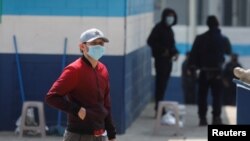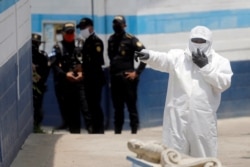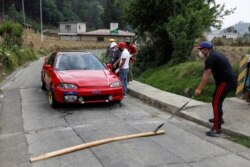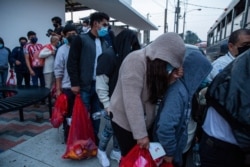Criminal. Failure. Degenerate.
Those are some of the labels Guatemalan migrant deportees and returnees have faced for years as they arrive back from the United States.
But now, coronavirus outbreaks connected to deportation flights from the U.S. have paved the wave for a new label: contagiados or the “infected.”
Across Latin America – in Guatemala, Mexico, Colombia, Haiti – people on U.S. deportation flights continue to test positive for coronavirus.
In late April, the Guatemalan government reported that a fifth of Guatemala’s cases were linked to such flights. Since, the number has only continued to jump and on Monday the Central American nation reported having nearly 1,912 COVID-19 infections and 35 deaths.
The rising numbers have brought a growing wave of stigma, threats and violence against not just migrants, but the aid providers who are protecting them. Many returning migrants have even been forced out of the very communities they left to economically support.
“They don't want people to return, so we're seeing this incredibly fuerte (strong) stigmatization.” said Carlos López, director of the Guatemala City migrant shelter, La Casa del Migrante. “They're not aliens, they're not animals, but they're being deeply abused in some places.”
Fear
The people who run La Casa already received death threats earlier this year for aiding migrants and asylum seekers with services like refuge, food, medical and legal consults.
But when the migrants they would normally take in started testing positive, a deep anxiety began to set in.
Guatemala’s government said in early May that at least 102 deportees had tested positive, and many came from one flight alone, with 71 of 76 deportees carrying the virus.
“It was a massive risk that it would kill someone on our team,” López said.
This is especially true in a country like Guatemala, where outbreaks could easily overwhelm a medical system in which public hospitals are often short of basic medicines and equipment. The shelter had to shut its doors for the first time in its history, and has struggled to continue providing aid to migrants and asylum seekers.
They feared not just exposure to the virus, but once again becoming a target. One aid organization that supports returning migrants and deportees told VOA they have stalled their work to reduce their visibility due to fear.
The threats began around mid-April when unsubstantiated rumors began to spread that recently arrived migrants had escaped a shelter and were breaking quarantine. Since then, incidents of stigmatization and violence have occurred across the country.
Not welcome
In San Marcos, a town near the Mexican border, a video by local media shows an angry crowd refusing to let a bus carrying migrants return home, saying they were afraid the migrants would spread the disease.
In another town, Santa Catarina Palopó, one deportee who had not tested positive for coronavirus said members of the community stormed his house, threatened his family and attacked his brother.
In the western city of Quetzaltenango, protests outside a migrant refuge called for returnees to be taken somewhere else, saying “we’re not racist, but we don’t want the migrants.” This comes after the city banned the arrival of buses carrying migrants returning to Guatemala from Mexico.
The instances are just a few of many, said Rosario Martínez, a researcher at Guatemala’s Latin American Faculty of Social Sciences, FLACSO, who has been documenting the threats. Similar harassment has been reported in other Latin American countries as well.
“They say that these people should be detained,” Martínez said. “Then later, comes the community violence. They attack their families, they throw rocks, they want to set their houses on fire.”
It’s not a new phenomenon, said Albino Castro, a former migrant in a small town outside Quetzaltenango. Castro spent seven years in New Jersey working as a cook. When he returned home, he described a strong feeling of culture shock that others like him share.
No longer home
“When you come home as a returnee, they treat you as if you're a [expletive] - a degenerate,” he said. “It's something that happens to almost every migrant.”
Returnees like Castro have been stigmatized for years, said Martínez. Communities often assume that if someone returns to the country voluntarily it’s because they failed in the U.S. or if they were deported, because they are criminals.
The majority of migrants in ICE detention of as of March 2020 did not have a single criminal conviction. Ten percent had serious criminal convictions, according to Immigrations and Customs Enforcement data.
While Castro was able to slowly overcome those labels by using money he earned in the U.S. to create a weaving workshop providing economic opportunities to those who might otherwise migrate, some never escape them. Instead, they find themselves ostracized from the same communities from which they migrated to often lift up through remittances.
With the spread of coronavirus in Guatemala “they are being stigmatized as migrants, but also as carriers of the virus,” Martinez said.
“They return home and then the rejection begins,” she said. “Migrants try to return to the communities they're from, and people begin to close their doors on them. They don't want the migrants to come.”
Martínez and other aid providers say the Guatemalan government has not done enough to aid deportees and returnees and has only added fuel to the fire.
Guatemalan President Alejandro Giammattei denounced the attacks, saying people should not see a returning migrant “as a criminal, but rather as a brother that has returned home.”
The Giammattei administration suspended such flights for two weeks as a reaction to the rising cases, allowing them to resume only when U.S. migration authorities had stepped up testing. Now, flights continue.
Migrants and their advocates worry that so, too, will the fear.








